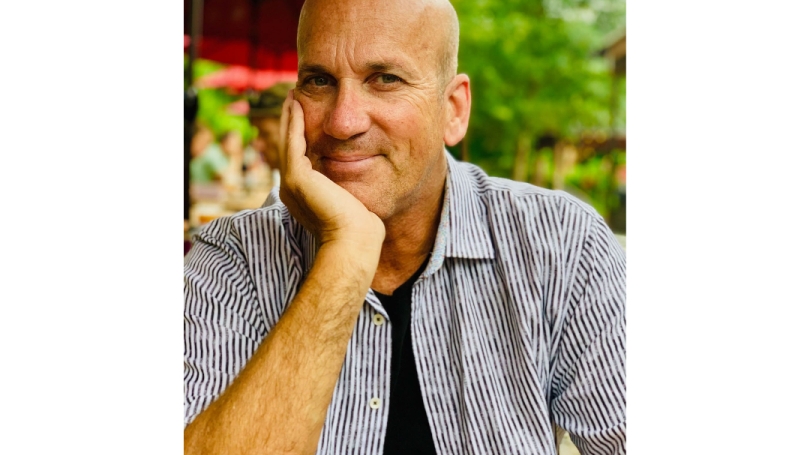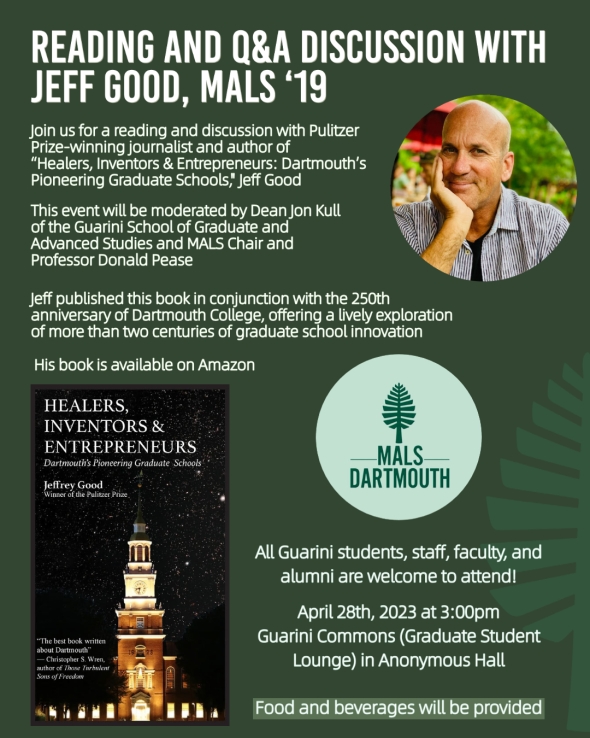

Read Jeff's Alumni Spotlight to learn more about his experience as a non-traditional graduate student at Dartmouth, how his MALS degree has improved his craft in writing, and what advice he has to offer to current and graduating MALS Students.
Meet MALS '19 alum, Jeff Good! Jeff is a veteran journalist who served as the editor of the Valley News, won the Pulitzer Prize in Editorial Writing, and authored (with contributor Susan Goreck) "Poison Mind," the nonfiction account of a Florida murder investigation. He is currently Director of Editorial and Media Relations for Acceleration Academies, a network of public high school dropout re-engagement programs.
Check out Jeff's write-up below to learn more about his experience as a non-traditional graduate student at Dartmouth, how his MALS degree has improved his craft in writing, and what advice he has to offer to current and graduating MALS Students:
Which year did you graduate from the program, and what was your concentration?
I graduated from MALS in 2019 and my concentration was Creative Writing. During my undergrad, I studied English Literature at St. Michael's College in Vermont.
Describe your current job and how your experience in MALS shaped your career:
I am the Editorial Director for Acceleration Academies, which is a network of public high school drop-out re-engagement programs. We partner with public school districts around the country to assist kids who have dropped out, or, are at risk of dropping out. Our job is to get them back on track to complete high school and earn a diploma.
For many of these students, traditional school hasn't worked: some have become teen parents, some work full-time to support themselves or their families, or some struggle in a one-size-fits-all classroom. We offer them a more personalized, class-by-class approach, and this service is free of charge.
To clarify, I am not a veteran educator; I am essentially the "storyteller-in-chief," writing profiles of students and graduates, all of whom have overcome some sort of adversity to get back on track.
Before my current position, I was a journalist for a long time, working as editor of the Valley News, and other newspapers, specialty publications, and websites in New England. Under my direction, staff won numerous national and regional awards, including New England Newspaper of Year. Writers I coached went on to success at the Washington Post, Associated Press, Tampa Bay Times, Chicago Tribune and Los Angeles Times. I was chosen to serve as a Pulitzer Prize nominating juror in 2009, 2010, 2017, 2018.
I've also written essays, poetry, and non-fiction books, so writing and editing are things that I've done my entire professional life.
How has MALS shaped your career?
I came into MALS as an older student, starting the program when I was in my early 50's. For me, the benefits of MALS fell into two categories: 1) after being out of college for three decades, it was such fun to go back into a first-class liberal arts program, and take a wide variety of classes. I took courses in Medical Ethics, "Diasporas and Migration," etc. I very much enjoyed the variety of courses, and found it fascinating to learn more about these topics. And, I absolutely loved being at Dartmouth with all of the brilliant professors, and equally brilliant students. I was learning from my classmates just as much as from my own reading and the professors. I loved being able to geek out in the liberal arts again after being in the "real world" for a long time.
Secondly, I learned a great deal about writing. I thought I was a pretty good writer going into the program, but I really improved my craft, thanks to Barbara Kreiger, the chair of the Creative Writing Concentration in the program. She was so insightful, and set a very high standard. And it was a fun challenge to reach that standard—and once in a while, I actually came close!
Important takeaways from the program:
I think that just being able to plunge into the Dartmouth community was a real treat and a privilege. This is true regardless of the age you enter the MALS Program, but for middle-aged people like me, it's just such a powerful experience to be at one of the best institutions of higher learning in the country and to soak it all in.
Did you take any courses outside of MALS?
Yes, I was enrolled in an undergraduate course in the Religious Studies department called "REL 038: Spiritual Autobiography," which was a survey of people who had experienced a major conversion event in their spiritual life. The central element of this class was to reflect upon your own spiritual journey. To do so, we shared journals, participated in group discussions, etc. It was a very rigorous course. There is one student whom I met in that course who I have stayed in touch with since, and it has been such a delight to watch her life and career unfold. I really encourage MALS students to enroll in an undergraduate course, because it's such a different slice of the Dartmouth experience.
Can you elaborate more about your book, "Healers, Inventors, and Entrepreneurs: Dartmouth's Pioneering Graduate Schools" which you wrote upon your completion of the program?
The project started after Professor Pease, Chair of the MALS Program and Chair of the 250th celebration of Dartmouth in 2019, and Dean of Guarini, Jon Kull, asked me to prepare a short history of graduate study here at Dartmouth. At the time, we envisioned the project to be a short--around 70 pages. But as my research went deeper and deeper, I grew more and more excited and ended up writing a entire book about more than two centuries of graduate school innovation at Dartmouth College.
In this sense, "Healers, Inventors, and Entrepreneurs: Dartmouth's Pioneering Graduate Schools" is about two things, the first being a comprehensive history of graduate studies here at Dartmouth. However, the book also explores an underlying theme: the controversial question of whether Dartmouth is a college devoted primarily to undergraduate instruction or a university steeped in research and professional education.
For many decades, Dartmouth has prided itself as being the Ivy League institution most heavily focused on good teaching practices to its undergraduates. Unlike most other institutions, professors primarily teach their own courses rather than delegating that to teaching assistants, and this has been widely celebrated for many years. But of course, Dartmouth's medical, engineering and business schools are among the nation's oldest and most prestigious, and the Guarini School encompasses a rapidly growing and cutting-edge collection of hard science, health care and liberal arts research and education programs. Despite the school's well-deserved reputation as a stellar undergraduate-focused college, innovative graduate study has always been a trademark of Dartmouth's academic history, with the MALS Program being no exception.
As the first interdisciplinary program of its kind, MALS provides a first-class education in itself and also lays the groundwork for further, intensive graduate studies. Where many other MALS programs across the country are part-time, remote, or are a part of a continuing education department, MALS at Dartmouth is really cutting edge in that it offers a full-degree awarding, intensive master's-level program at the Guarini School of Graduate and Advanced Studies.
In this sense, the book's answer to the existential question of whether Dartmouth is a college or a university is that it is both.
Any advice to incoming, current, or graduating MALS students?
I would encourage people to graze as widely as possible in the Liberal Arts offerings. Take as many different kinds of courses, and work with as many kinds of professors as you can—even if you are only exploring one specific area of a subject. I loved the opportunity to have that area of focus on Creative Writing, and especially from Professor Kreiger, who I think is a rock star.
Jeff is hosting a reading and Q&A discussion on Friday, April 28th at 3:00pm in the Guarini Commons at Anonymous Hall. This event will be moderated by Dean Jon Kull of the Guarini School of Graduate and Advanced Studies at Dartmouth and MALS Chair and Professor Donald Pease.
Food and refreshments will be provided. All Guarini students, staff, faculty, and alumni are welcome to attend!
For event information, please visit: https://home.dartmouth.edu/events/event?event=70315&begin=2023-04-27&end=2023-04-28&offset=20&limit=10